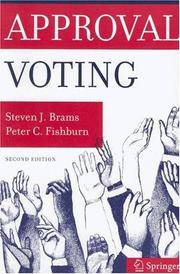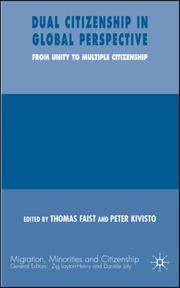| Listing 1 - 10 of 44 | << page >> |
Sort by
|
Book
Year: 1924 Publisher: Helsinki : Suomalainen tiedeakatemia = Academia scientiarum fennica,
Abstract | Keywords | Export | Availability | Bookmark
 Loading...
Loading...Choose an application
- Reference Manager
- EndNote
- RefWorks (Direct export to RefWorks)
DEUTSCHE SPRACHE --- MORPHOLOGIE --- DEUTSCHE SPRACHE --- MORPHOLOGIE --- PLURAL
Book
Year: 1893 Publisher: Bruxelles : H. Lamertin,
Abstract | Keywords | Export | Availability | Bookmark
 Loading...
Loading...Choose an application
- Reference Manager
- EndNote
- RefWorks (Direct export to RefWorks)
Vote plural --- Suffrage universel --- Système électoral --- Vote plural --- Suffrage universel --- Système électoral
Book

ISBN: 3110755769 3110690594 Year: 2023 Publisher: Berlin ; Boston : De Gruyter,
Abstract | Keywords | Export | Availability | Bookmark
 Loading...
Loading...Choose an application
- Reference Manager
- EndNote
- RefWorks (Direct export to RefWorks)
Die Beiträge des Bandes befassen sich in disziplinärer und interdisziplinärer Perspektive aus Literaturwissenschaft, Kunstgeschichte und Musikwissenschaft mit den Ästhetiken pluraler Autorschaft. Der Band zielt darauf, plurale Autorschaft in der Vormoderne als Koordinate einer Anderen Ästhetik zu erschließen und kulturgeschichtlich zu kontextualisieren. Dabei fokussiert der Band zwei Leitfragen: Welche Formen pluraler Autorschaft gibt es in der Vormoderne, und wie werden diese gemeinschaftlichen Schaffensprozesse ästhetischer Akte und Artefakte reflektiert? Wie wirken sich gemeinschaftliche Schaffensprozesse auf die ästhetische Faktur sowie die Funktion, Bedeutung und Rezeption eines Artefakts aus? Die zweite Frage schließt Aspekte wie die materielle Produktion von Texten und Bildern ebenso ein wie etwa den Status anonymer Werke und Referenzen auf göttliche Co-Autorschaft. Die Beiträge untersuchen den historischen Mehrwert gemeinschaftlicher Autorschaft, wobei sie auch Paratextualität und Intermedialität sowie ökonomische Erwägungen bei der Produktion und Rezeption ästhetischer Artefakte berücksichtigen. The contributions in this volume examine the aesthetics of plural authorship from the disciplinary and interdisciplinary perspectives of literary studies, art history, and musicology. The volume aims to analyze plural authorship in the pre-modern era as a coordinate of a different aesthetics and to contextualize it within the history of culture.
LITERARY CRITICISM / European / General. --- Plural authorship. --- other aesthetics.
Book
ISBN: 908964444X 9048516943 1283698412 Year: 2012 Publisher: Amsterdam : Amsterdam University Press,
Abstract | Keywords | Export | Availability | Bookmark
 Loading...
Loading...Choose an application
- Reference Manager
- EndNote
- RefWorks (Direct export to RefWorks)
Dual nationality has been the subject of heated debate in the Netherlands in recent years. In this historical and international comparative study, De Hart shows that such debates are not unique to our time, nor to the Netherlands. An analysis of political debates in the United States, Germany and the Netherlands since 1945 shows that dual nationality is viewed very differently, depending on the context and the group being discussed. The analysis is interspersed with interviews with immigrants, emigrants and members of mixed families about the sometimes very personal meaning of dual nationality. Discussions on the dual nationality of Japanese-Americans during the Second World War, of Dutch emigrants in South Africa in the 1980s, are discussed.
Dual nationality --- Double nationality --- Dual allegiance --- Dual citizenship --- Nationality, Dual --- Nationality, Plural --- Plural nationality --- Citizenship --- Conflict of laws --- Law and legislation

ISBN: 1280940522 9786610940523 0387498966 0387498958 9780387498959 0387498958 9780387498959 9780387498966 Year: 2007 Publisher: New York, NY Springer Science+Business Media, LLC
Abstract | Keywords | Export | Availability | Bookmark
 Loading...
Loading...Choose an application
- Reference Manager
- EndNote
- RefWorks (Direct export to RefWorks)
Approval Voting proposes a compelling way to elect some 500,000 officials in public elections. Under this system voters may vote for, or approve of, as many candidates as they like in multicandidate elections. Among the many benefits of approval voting are its propensity to elect the majority candidate (rather than the strongest minority candidate, as often occurs under plurality voting), its relative invulnerability to insincere or strategic voting, and—by offering voters the opportunity to influence election outcomes more equitably—a probable increase in voter turnout. Since the publication of the first edition of this book, its arguments in favor of an election reform practically unknown in 1983 have stood the test of time. Perhaps the proof of the pudding lies in the adoption of approval voting by about a dozen professional societies—several with tens of thousands of members—and their generally favorable experience with it. After a generation of discussion and debate on the subject, the authors remain convinced that Approval Voting is as relevant today as it was when rigorous analysis and systematic empirical research on this election reform began more than 30 years ago.
Voting, Plural. --- Voting, Plural --- Plural voting --- Elections --- Voting --- Mathematics. --- Public finance. --- Political science. --- Economic theory. --- Mathematics, general. --- Public Economics. --- Political Science. --- Economic Theory/Quantitative Economics/Mathematical Methods. --- Economic theory --- Political economy --- Social sciences --- Economic man --- Administration --- Civil government --- Commonwealth, The --- Government --- Political theory --- Political thought --- Politics --- Science, Political --- State, The --- Cameralistics --- Public finance --- Currency question --- Math --- Science --- Public finances --- Voting, Plural - United States
Book
ISBN: 180356198X Year: 2023 Publisher: London : IntechOpen,
Abstract | Keywords | Export | Availability | Bookmark
 Loading...
Loading...Choose an application
- Reference Manager
- EndNote
- RefWorks (Direct export to RefWorks)
This book discusses an important topic in obstetrics, that of multiple pregnancies. Multiple pregnancy may be determined via clinical history, physical pelvic examination, blood test, or pelvic ultrasound. Babies may be delivered vaginally or via Cesarean section and there is the possibility of complications due to early delivery, which may lead to long- or short-term health problems for the infant. This book addresses these issues in four sections that discuss the basic aspects of multiple pregnancies, diagnosis of multiple pregnancy, breastfeeding, and complications related to multiple pregnancies.
Multiple pregnancy. --- Multifetal pregnancy --- Plural pregnancy --- Pregnancy, Multiple --- Pregnancy --- Multiple birth
Book
Year: 1983 Publisher: Frankfurt a.M. PH02
Abstract | Keywords | Export | Availability | Bookmark
 Loading...
Loading...Choose an application
- Reference Manager
- EndNote
- RefWorks (Direct export to RefWorks)
In der Reihe Slavistische Beiträge werden vor allem slavistische Dissertationen des deutschsprachigen Raums sowie vereinzelt auch amerikanische, englische und russische publiziert. Darüber hinaus stellt die Reihe ein Forum für Sammelbände und Monographien etablierter Wissenschafter/innen dar.
linguistics --- Dingley --- Endings --- Linguistik --- Nouns --- Peripheral --- Petrine --- Philologie --- Plural --- Russland --- Sermons --- Sprachtheorie --- Sprachwissenschaft

ISBN: 023000654X 9780230006546 Year: 2007 Publisher: Basingstoke Palgrave Macmillan
Abstract | Keywords | Export | Availability | Bookmark
 Loading...
Loading...Choose an application
- Reference Manager
- EndNote
- RefWorks (Direct export to RefWorks)
#SBIB:321H30 --- Hedendaagse politieke en sociale theorieën (vanaf de 19de eeuw): algemeen (incl. utilitarisme, burgerschap) --- Citizenship --- Dual nationality --- Globalization --- Double nationality --- Dual allegiance --- Dual citizenship --- Nationality, Dual --- Nationality, Plural --- Plural nationality --- Conflict of laws --- Law and legislation
Book
ISBN: 1789850800 1789850797 1838817646 Year: 2019 Publisher: London : IntechOpen,
Abstract | Keywords | Export | Availability | Bookmark
 Loading...
Loading...Choose an application
- Reference Manager
- EndNote
- RefWorks (Direct export to RefWorks)
Multiple Pregnancy - New Challenges is a comprehensive book, written in an organized and concise format. The book offers an immersion into multiple pregnancy. Each chapter presents the reader with various important issues related to the subject matter. The book covers all spectrums of multiple pregnancy such as epidemiology, etiology, diagnosis, prenatal care, unique complications in monochorionic pregnancies, preterm birth and mode of delivery. Through its 10 chapters the book contemplates the most relevant aspects of multiple pregnancy. Authors from all over the world have contributed to this book, bringing the best from their research experiences. The book give the reader a state-of-the-art update of multiple pregnancy.
Multiple pregnancy. --- Multifetal pregnancy --- Plural pregnancy --- Pregnancy, Multiple --- Pregnancy --- Multiple birth --- Medicine --- Maternal-Fetal Medicine --- Health Sciences --- Obstetrics and Gynecology
Dissertation
Year: 2016 Publisher: Liège Université de Liège (ULiège)
Abstract | Keywords | Export | Availability | Bookmark
 Loading...
Loading...Choose an application
- Reference Manager
- EndNote
- RefWorks (Direct export to RefWorks)
Le droit de vote est un droit politique de l’actionnaire. L’exercice de ce droit lui permet de concourir à la formation de la majorité à l’assemblée générale, et ainsi d’exercer une certaine influence sur la gestion de la société. Les articles 541 C. soc. (SA) et 275, al. 1er C. soc. (SPRL) énoncent un principe d’ordre public de proportionnalité du droit de vote de l’actionnaire à sa participation dans le capital social. Il résulte de ces dispositions une prohibition du vote plural (qui, en pratique, peut néanmoins être contournée). Pareille interdiction n’existe pas dans la SCRL, où la règle « une part, une voix » est supplétive (art. 382, al. 1er C. soc.). Par ailleurs, une forme de vote plural existe au sein du conseil d’administration : la voix prépondérante du président (art. 518, § 1er, al. 3 C. soc.). Le principe du suffrage proportionnel a été consacré par l’arrêté royal n°26 du 31 octobre 1934. Auparavant, le vote plural n’était pas légalement interdit et la pratique y a fréquemment recouru. Son utilisation abusive (dans l’objectif inavoué d’assurer la permanence de la gestion et l’irrévocabilité du conseil d’administration), ainsi que les controverses en doctrine et en jurisprudence sur sa légalité, ont poussé le législateur à intervenir par une mesure d’interdiction totale. A cet égard, la Belgique se distingue de plusieurs Etats membres de l’Union européenne. Le vote plural existe, en effet, notamment : en France (attribution d’un droit de vote double aux actionnaires « fidèles »), aux Pays-Bas (octroi de « droits spéciaux » aux détenteurs d’« actions de priorité ») et au Royaume-Uni (autorisation inconditionnelle du vote plural depuis une décision de la House of Lords). Le vote plural n’est toutefois pas bien vu par la Commission européenne, qui souhaite mettre en place une véritable « démocratie des actionnaires », et la jurisprudence de la Cour de justice de l’Union européenne sur la golden share pourrait lui être fatal si une assimilation des deux instruments était envisagée. Il reste néanmoins qu’en l’absence de réaction du législateur européen, la Belgique a tout intérêt à élargir les possibilités d’utilisation du vote plural à d’autres sociétés que la SCRL, si elle ne souhaite pas souffrir de la concurrence réglementaire créée, entre les droits des Etats membres, par la jurisprudence de la Cour de justice de l’U.E. Dans sa « Modernisation du droit des sociétés », le Centre belge du droit des sociétés (composé de quatorze professeurs issus des différentes Facultés de droit du pays) envisage cette solution. Le système choisi diffère selon le type de société concerné : il s’agit, dans les sociétés fermées (SPRL, SA non cotée), d’une liberté de prévoir (statutairement ou conventionnellement) des votes multiples et, dans les sociétés cotées, de l’attribution d’un vote double « de fidélité ». Quelques ajustements au modèle présenté sont proposés. Le premier concerne l’utilité d’une réglementation propre aux SA non cotées. Le second porte sur l’option du droit de vote « de fidélité » dans les SA cotées. La question du sort de l’avantage en cas de transmission du titre est également examinée.
droit de vote des actionnaires --- vote plural --- SA --- SPRL --- SCRL --- Droit, criminologie & sciences politiques > Droit économique & commercial
| Listing 1 - 10 of 44 | << page >> |
Sort by
|

 Search
Search Feedback
Feedback About UniCat
About UniCat  Help
Help News
News